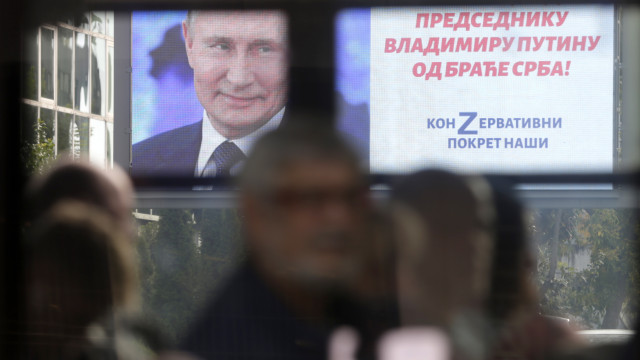Serbia is expelling Russian opposition figures in Russia, and this is happening more and more often as Belgrade cooperates closely with Moscow, writes German public broadcaster ARD. A signature can become a problem.
Elena Koposova has no choice but to check her e-mail all day. In early February, she received a letter from Serbia's Ministry of the Interior stating that she was a "threat to national security" and therefore had to leave the country within 30 days.
She has since hoped to be informed that this was a mistake. The Russian woman who moved to Serbia five years ago is an ordinary woman: 54 years old, translator, mother of two children.
She says she has never been really politically active except once: "Only that time, two years ago, I signed a petition on Facebook against Russia's war of aggression, nothing else."
Now her residence permit has not been extended. The Ministry of Internal Affairs of Serbia did not state the reasons why she poses a threat to national security.
The pressure on the Russians in Serbia is increasing
Koposova does not wish to return to Russia under any circumstances. He fears that as an expelled person who has spoken out critically about the war, he will end up in prison in Russia. Why are they refusing to extend her residence permit? She is convinced: "The Kremlin is definitely behind this. They are putting pressure on Serbia."
Elena Koposova is not the first Russian citizen to experience persecution in Serbia. More and more people are not getting a residence permit with the same arguments. The pressure on the Russians in exile in the Balkan country is intensifying.
So far, 13 such cases are known, reported the opposition organization "Russian Democratic Society" (RDS). But they may be even more, as those affected often do not want publicity.
Serbia - a reliable partner of Russia
It is precisely this intimidation and silencing of the opposition abroad that is the goal of the Russian state, says Peter Nikitin, founder of RDO. "Because of intimidation, we, the Russians in exile in Serbia, fail to create a movement to oppose the Russian regime, although in reality we are enough."
And Serbia, which is a candidate country for membership in the European Union, once again proves that it is a reliable partner of Russia. The country has not yet joined Western sanctions against Moscow and still imports about 90% of its gas from Russia.
Pursuit of Kara-Murza
Another case where Russia and Serbia are alleged to have cooperated closely in suppressing critical voices is that of Vladimir Kara-Murza. The Russian journalist reported that the Serbian secret services had eavesdropped on him during a trip to Belgrade.
There he met with Russian oppositionists in exile. The recorded conversations immediately reached the Russian authorities. Kara-Murza is now in prison, serving a 25-year sentence for criticizing the war of aggression.
"The basis of this cooperation is the 2021 agreement between Serbia and Russia to suppress 'color revolutions,'" says Aleksandra Tomanic, Executive Director of the European Fund for the Balkans.
The then Minister of the Interior of Serbia, Aleksandar Vulin, called all social movements "color revolutions", which he believed were tools of the West to destabilize Serbia and Russia.
Numerous Russians in exile in Serbia
"But the news is that, in the meantime, there are a significant number of Russians in exile in Serbia who are ready to take to the streets and criticize the Russian regime there," Tomanic believes. And in order to prevent this, she notes, more and more cases like the one against Elena Koposova are being conducted.
"Many people advised me to keep quiet," said Koposova. But she does not want to remain silent because, as she notes, Serbia has become her homeland in the meantime. Her family has almost finished building a house, the children speak Serbian, go to school. Last weekend, the younger son was invited to a school friend's birthday party.
Elena Koposova has to buy time. She filed an appeal against the decision of the Ministry of the Interior. /BGNES







